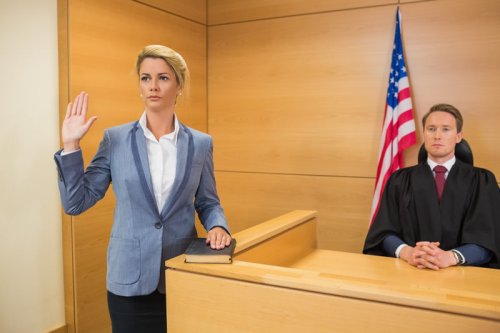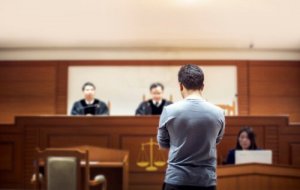The Psychology of the Witness

Witnesses are a fundamental part of a trial. What they have to say may support the different physical evidence presented before the judge.
However, a witness’ testimony can’t be taken as a dogma of faith. Sometimes, and even if you don’t want to believe in it, they may not be telling the whole truth. It’s likely that they’re lying on purpose or maybe there’s a distortion in their memory.
The psychology of the witness tries to study, understand, and deal with those mnemonic problems that affect an individual, and that can, in turn, be of influence when issuing their testimony before a judge. To what extent can the information they provide be taken seriously? At the end of the day, witnesses are only human and many stimuli can affect their memory in various ways.
Memory in the psychology of the witness
We like to believe that our memory is infallible. “I remember that as if it had been yesterday,” “It’s something I could never forget.” Any of these phrases ring a bell? How many times have we said or thought something similar? Although we can remember events that happened a long time ago, the mental images that we now reproduce aren’t as exact as we may think.
They do not even look like how we remembered it 2 days ago. The passage of time exerts great influence on our memory – and that’s when erroneous information comes into play. And, of course, the older the memory is the less clear and exact it will be.
As strange and unusual as it may seem, we can come to remember something we never lived. The psychology of the witness will analyze these processes to try to minimize possible errors.

The effect of erroneous information
Elizabeth Loftus, along with her colleague Palmer, conducted a study to demonstrate that, after witnessing an event, if afterward someone gives us additional information about what happened, we can unwittingly adapt the memory to fit this new information.
In the experiment in question, the participants were asked to witness a car accident. Subsequently, the spectators were told that they should determine the speed at which both cars went.
However, they asked each group the same question but using a different noun: collision, smash, crash, etc. Each of them had different connotations associated with how we use them in our everyday language.
Now, although all test subjects had seen the same accident (at the same speed), the truth is that when they later assessed the force of the collision, smash, impact, etc., most of them issued a response according to what the noun suggested.
Influential factors in erroneous information
Sources, as well as conditions, can induce erroneous information; they may even alter the memory of an event. When an accident occurs, for example, it’s normal for spectators to comment on the details. It may be the case that, without malicious intent, one of them introduces some false element and ends up contaminating the other person’s memory.
Therefore, one of the proposed solutions is to try to avoid potential witnesses talking to each other. Likewise, the media often uses people who have witnessed or heard something, reporting it in an unclear or very biased way.
On the other hand, the time elapsed since observing the fact until presenting the story of the event is very decisive. It’s easier for us to accept false data as true the longer it has elapsed. Why is that?
Because the information is less recent. Because of this, we’re less likely to perceive discrepancies in our memory and, in addition, it’s easier for us to come up with new information as we move away from the date of the incident.
The cognitive interview in the psychology of the witness
One of the means used to try to obtain the maximum information and quality is the cognitive interview. Fisher and Geiselman developed this strategy in 1984 when they observed that the police in their interrogations would lose a lot of the information due to their lack of ability. And, for the same reason, they’d spend a long time and resources following false leads.
The psychology of the witness has influenced the development and improvement of the cognitive interview. This model was developed to improve the relationship between the interviewee and the interviewer.
It’s based on rapport – which is primordial to build an atmosphere of trust and comfort. By not feeling intimidated, the interviewee will probably provide more information.
What is the cognitive interview about?
The cognitive interview uses open questions as a way to obtain testimonies. Basically, the interviewer asks the witness a question that may allow them to expand on everything they experienced. Undoubtedly, asking open questions instead of closed ones is much better in this case.
Open questions allow the individual to tell the facts as if they were narrating a story; while closed questions limit the responses to a very specific event. This increases the likelihood of making mistakes, and also increases the probability of introducing bias.

Cognitive interview techniques
This model employs four techniques:
Restoring the context
This involves mentally reconstructing the circumstances in which the events took place. The emotions that may arise in the witness can allow the officers in charge to recover more information.
Telling it all
Everything that’s part of the memory must be included in the story.
Remembering the events in a different order
Instead of building the story from the first thing that happened to the last, this method suggests that the witness tells it backward (going back in time instead of forwarding).
Making a change in perspective
This is making the witness place themselves in another point mentally. For example, if the witness was in a corner of the place where the robbery took place, they should imagine what things would’ve been like if they’d been at the counter.
The results obtained in different studies that have used cognitive interview have demonstrated that this technique, by the way in which the facts are told and the empathy and trust that is provoked between both parties, increases the number of correct details and decreases the proportion of mistakes.
We believe that there are many different factors surrounding a witness; personal or environmental circumstances that influence the act of remembering. Many times, an error in the story doesn’t necessarily mean the witness is lying, at least not always. They simply changed their memories unconsciously.
Now, although they may be sure that something happened in such a way, being doubtful and checking the facts is still important.
The psychology of the witness contributes to finding new tools (or improve existing ones) to optimize the information we obtain about an event. Can we always trust what the witnesses remember? The answer is no. But can we get more true information from witnesses? As you can see, this is what the psychology of the witness aims for.
Witnesses are a fundamental part of a trial. What they have to say may support the different physical evidence presented before the judge.
However, a witness’ testimony can’t be taken as a dogma of faith. Sometimes, and even if you don’t want to believe in it, they may not be telling the whole truth. It’s likely that they’re lying on purpose or maybe there’s a distortion in their memory.
The psychology of the witness tries to study, understand, and deal with those mnemonic problems that affect an individual, and that can, in turn, be of influence when issuing their testimony before a judge. To what extent can the information they provide be taken seriously? At the end of the day, witnesses are only human and many stimuli can affect their memory in various ways.
Memory in the psychology of the witness
We like to believe that our memory is infallible. “I remember that as if it had been yesterday,” “It’s something I could never forget.” Any of these phrases ring a bell? How many times have we said or thought something similar? Although we can remember events that happened a long time ago, the mental images that we now reproduce aren’t as exact as we may think.
They do not even look like how we remembered it 2 days ago. The passage of time exerts great influence on our memory – and that’s when erroneous information comes into play. And, of course, the older the memory is the less clear and exact it will be.
As strange and unusual as it may seem, we can come to remember something we never lived. The psychology of the witness will analyze these processes to try to minimize possible errors.

The effect of erroneous information
Elizabeth Loftus, along with her colleague Palmer, conducted a study to demonstrate that, after witnessing an event, if afterward someone gives us additional information about what happened, we can unwittingly adapt the memory to fit this new information.
In the experiment in question, the participants were asked to witness a car accident. Subsequently, the spectators were told that they should determine the speed at which both cars went.
However, they asked each group the same question but using a different noun: collision, smash, crash, etc. Each of them had different connotations associated with how we use them in our everyday language.
Now, although all test subjects had seen the same accident (at the same speed), the truth is that when they later assessed the force of the collision, smash, impact, etc., most of them issued a response according to what the noun suggested.
Influential factors in erroneous information
Sources, as well as conditions, can induce erroneous information; they may even alter the memory of an event. When an accident occurs, for example, it’s normal for spectators to comment on the details. It may be the case that, without malicious intent, one of them introduces some false element and ends up contaminating the other person’s memory.
Therefore, one of the proposed solutions is to try to avoid potential witnesses talking to each other. Likewise, the media often uses people who have witnessed or heard something, reporting it in an unclear or very biased way.
On the other hand, the time elapsed since observing the fact until presenting the story of the event is very decisive. It’s easier for us to accept false data as true the longer it has elapsed. Why is that?
Because the information is less recent. Because of this, we’re less likely to perceive discrepancies in our memory and, in addition, it’s easier for us to come up with new information as we move away from the date of the incident.
The cognitive interview in the psychology of the witness
One of the means used to try to obtain the maximum information and quality is the cognitive interview. Fisher and Geiselman developed this strategy in 1984 when they observed that the police in their interrogations would lose a lot of the information due to their lack of ability. And, for the same reason, they’d spend a long time and resources following false leads.
The psychology of the witness has influenced the development and improvement of the cognitive interview. This model was developed to improve the relationship between the interviewee and the interviewer.
It’s based on rapport – which is primordial to build an atmosphere of trust and comfort. By not feeling intimidated, the interviewee will probably provide more information.
What is the cognitive interview about?
The cognitive interview uses open questions as a way to obtain testimonies. Basically, the interviewer asks the witness a question that may allow them to expand on everything they experienced. Undoubtedly, asking open questions instead of closed ones is much better in this case.
Open questions allow the individual to tell the facts as if they were narrating a story; while closed questions limit the responses to a very specific event. This increases the likelihood of making mistakes, and also increases the probability of introducing bias.

Cognitive interview techniques
This model employs four techniques:
Restoring the context
This involves mentally reconstructing the circumstances in which the events took place. The emotions that may arise in the witness can allow the officers in charge to recover more information.
Telling it all
Everything that’s part of the memory must be included in the story.
Remembering the events in a different order
Instead of building the story from the first thing that happened to the last, this method suggests that the witness tells it backward (going back in time instead of forwarding).
Making a change in perspective
This is making the witness place themselves in another point mentally. For example, if the witness was in a corner of the place where the robbery took place, they should imagine what things would’ve been like if they’d been at the counter.
The results obtained in different studies that have used cognitive interview have demonstrated that this technique, by the way in which the facts are told and the empathy and trust that is provoked between both parties, increases the number of correct details and decreases the proportion of mistakes.
We believe that there are many different factors surrounding a witness; personal or environmental circumstances that influence the act of remembering. Many times, an error in the story doesn’t necessarily mean the witness is lying, at least not always. They simply changed their memories unconsciously.
Now, although they may be sure that something happened in such a way, being doubtful and checking the facts is still important.
The psychology of the witness contributes to finding new tools (or improve existing ones) to optimize the information we obtain about an event. Can we always trust what the witnesses remember? The answer is no. But can we get more true information from witnesses? As you can see, this is what the psychology of the witness aims for.
This text is provided for informational purposes only and does not replace consultation with a professional. If in doubt, consult your specialist.







